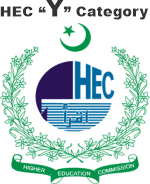REVIVING THE UMMAH THROUGH INTEGRATED KNOWLEDGE: IQBAL’S CONTRIBUTIONS TO ISLAMIC INTELLECTUAL REVIVAL
Keywords:
Reviving, Ummah, Integration of Knowledge, Epistemology, Civilization.Abstract
This study delves into Allama Muhammad Iqbal's philosophy of integrated knowledge, emphasizing the harmonious fusion of reason, revelation, and intuition as a means to revitalize the Muslim Ummah and overcome intellectual stagnation. Iqbal’s visionary framework closely aligns with the concept of Islamization, advocating for the integration of traditional Islamic principles with modern scientific and philosophical advancements to create a balanced epistemological approach. His emphasis on ijtihad (independent reasoning) serves as a transformative tool for renewal, enabling Muslims to confront contemporary challenges such as materialism, globalization, and ethical dilemmas posed by technological advancements. By critiquing intellectual inertia and championing ethical dimensions in science, governance, and education, Iqbal provides a roadmap for an Islamized approach to knowledge. This research highlights the enduring relevance of Iqbal’s ideas, advocating for educational and intellectual reform to inspire holistic progress and restore the Ummah’s leadership in global knowledge production, while fostering a meaningful engagement with modernity within an Islamic framework.
Downloads
References
Bakar, O. (2021). The history and philosophy of Islamic science. Cambridge: Islamic Texts Society, 112–115.
Sardar, Z. (2019). Reinvention: A new future for Islamic civilization. London: Hurst & Company, 65–70.
Kamali, M. H. (2020). Islam, ethics, and governance. Kuala Lumpur: IIIT, 135–140.
Auda, J. (2018). Maqasid al-Shari’ah as philosophy of Islamic law: A systems approach. Herndon: IIIT, 45–50.
Moosa, E. (2021). Ghazali and the poetics of imagination. Chapel Hill: University of North Carolina Press, 203–207.
Iqbal, M. (1930). The reconstruction of religious thought in Islam. Lahore: Shaikh Muhammad Ashraf, 45–90.
Rahman, F. (1982). Islam and modernity: Transformation of an intellectual tradition. Chicago: University of Chicago Press, 115.
Moosa, E. (2015). What is a madrasa? Chapel Hill: University of North Carolina Press, 112.
Nasr, V. (2001). Islamic leviathan: Islam and the making of state power. Oxford: Oxford University Press, 65.
Esposito, J. L. (1999). Islam and the West: Muslim voices of dialogue and cooperation. Oxford: Oxford University Press, 275.
Ramadan, T. (2010). The quest for meaning: Developing a philosophy of pluralism. London: Penguin Books, 189.
Nasr, S. H. (1968). Science and civilization in Islam. Cambridge, MA: Harvard University Press, 75.
Saliba, G. (2007). Islamic science and the making of the European renaissance. Cambridge, MA: MIT Press, 135.
Valli, M. I. (2012). The vision of Islam in Muhammad Iqbal. Karachi: Royal Book Company, 165.
Al-Ghazali. (2000). Tahafut al-falasifa (The incoherence of the philosophers). Translated by M. E. Marmura. Provo: Brigham Young University Press, 92.
Al-Faruqi, I. R. (1982). Islamization of knowledge: General principles and work plan. Herndon: International Institute of Islamic Thought, 194.

Downloads
Published
Issue
Section
License
Copyright (c) 2024 PAKISTAN ISLAMICUS (An International Journal of Islamic & Social Sciences)

This work is licensed under a Creative Commons Attribution 4.0 International License.
This work is licensed under a Creative Commons Attribution 4.0 International License.
































